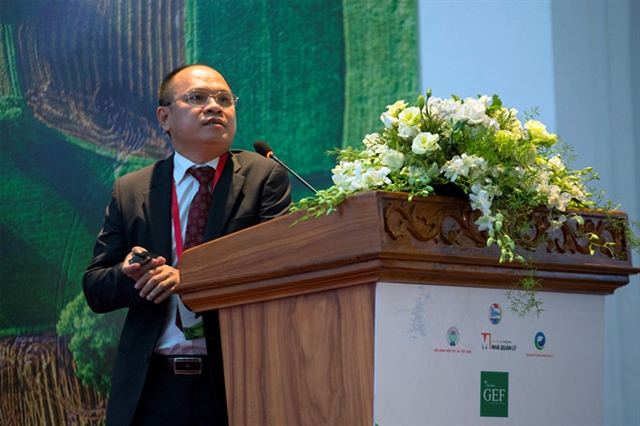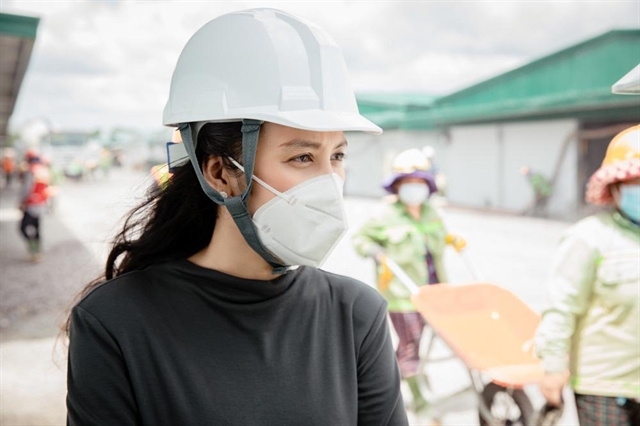 Society
Society


|
| Lê Thành, chairman of the Council of the Green Economics Institute, said if there is a better capacity and management system, the community health stations will help reduce the pressures that currently major hospitals are struggling with every day." — Photo courtesy of the institute |
HCM CITY — The Green Economics Institute has begun a programme called ‘Improving the quality of community health’ to foster examination and treatment capacity in the grassroots healthcare system in HCM City.
Vạn Thịnh Phát is the sponsor and Japan’s Medi Hub is the solution provider, and the three institutions will collaborate to research and implement a pilot model of this project in all 24 districts of the city.
The grassroots healthcare system is the "gatekeeper" or the first place people approach when they fall sick or suffer from some diseases. However, the community healthcare system showed how inadequate and weak it is during the recent fight against the COVID-19 pandemic.
At an online meeting with 140 voters of the city's National Assembly delegation in the health sector in October last year, Nguyễn Văn Vĩnh Châu, deputy director of the city Department of Health, said, "There still remain weaknesses in human resources, organisational structure, infrastructure, and equipment in the public health system from the Centre for Disease Control to the district medical centres and health stations of wards and communes.”
Outdated facilities and equipment, lack of human resources, a mentality of not trusting the grassroots healthcare system and instead preferring to get their examination and treatment done at the higher level have weakened community healthcare.
It is to mitigate all this and help improve the examination and treatment capacity of the grassroots healthcare system that the Green Economics Institute has initiated ‘Improving the quality of community health’.
Besides helping the grassroots system build electronic health records for managing and monitoring each household and individual, the initiative also focuses on investment of resources at the Centre for Disease Control and district health stations in wards and communes to improve their capacity to deliver examination and treatment services to the public through which hospital overloads could be mitigated.
Talking about solutions to improve the quality of medical facilities and overcome the shortage of human resources, Hidetoyo Teranishi, CEO of Medi Hub Company, said: "If medical staff and small stations have a standardised system of online treatment by software, patient databases and electronic medical records will help medical staff immediately screen for urgent or minor illnesses, or instantly connect to the patient care line with thousands of doctors.
“It is most effective support and medical stations with few staff can operate effectively even if they are far from central and frontline hospitals.”
Founded in 2014 in Japan with a mission of "connecting the world and creating a healthy future," improving public health through digital transformation in the medical field, Medi Hub has developed throughout Asia with more than 500 hospitals, healthcare centres, high-class nursing homes, and others who are customers and partners, “Medi Hub is ready to connect resources in technology, engineering and [others] from hundreds of thousands of experienced medical doctors in Japan together with Vietnamese partners to build this model," Teranishi said.
Lê Thành, chairman of the Council of the Green Economics Institute, said this method of collaboration offers a promising solution, "The community health system must always be ready to respond to emergencies and the government can call for action to use grassroots medical stations if necessary.
“In normal situations, the private sector could bid to provide medical examination and treatment services at the stations. If there is a better capacity and management system, the community health stations will help reduce the pressure … that currently major hospitals are struggling with every day."

|
| Trương Huệ Vân, vice chairwoman of Vạn Thịnh Phát Group, which has assisted the Government in the fight against the pandemic, explains why the group has chosen to participate in the ‘Improving the quality of community health’’ programme. — Photo courtesy of the Green Economics Institute |
Trương Huệ Vân, vice chairwoman of Vạn Thịnh Phát Group, which has assisted the Government in the fight against the pandemic, explained why the group has chosen to participate in this initiative: “Prime Minister Phạm Minh Chính once campaigned for the spirit of ‘every ward is a fortress’. I believe the initiative proposed by the Green Economics Institute is an integral part of this direction by the Government leader.
“If we can strengthen the local community healthcare system, it means we have built a ‘firewall’ to protect people's health, improve the quality of life and contribute to the nation’s development with the right investment in social infrastructure through public-private partnerships.”
Deputy Minister of Health Prof Dr Trần Văn Thuấn said: “The grassroots healthcare network covers every village, hamlet and neighbourhood in all regions across the country. However, people's healthcare needs have changed a lot, especially with the emergence of the COVID-19 pandemic, which requires grassroots healthcare care system to further improve in terms of facilities, finance, human resources and technology.
“More than ever, the Ministry of Health calls on individuals, communities and businesses to join hands to come up with initiatives and solutions in public services, human resources, technology, and investment to improve the efficiency and quality of grassroots healthcare facilities.” — VNS